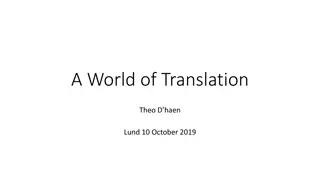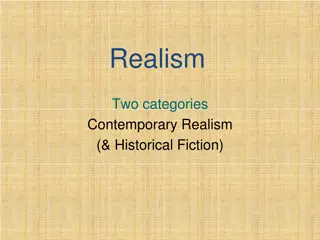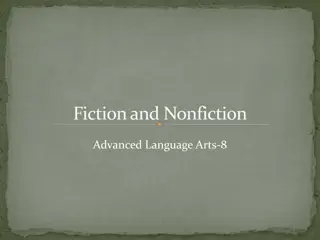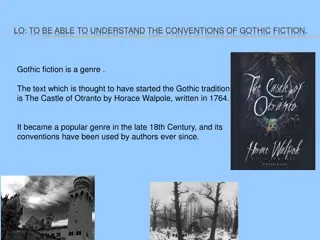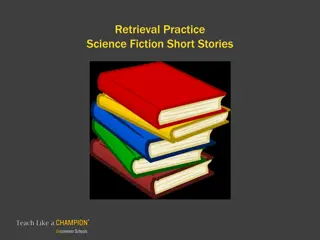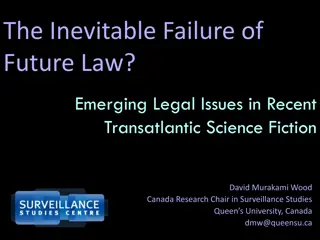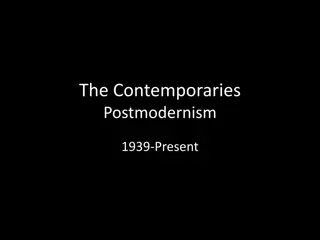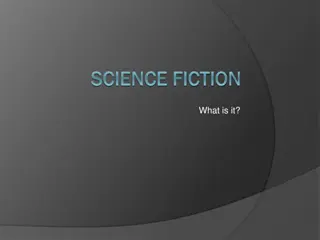Absurdist Fiction in Literature
A genre emerging from post-war disillusionment, Absurdist Fiction delves into the purposeless nature of life through meaningless actions, challenging existential certainties. Influenced by existentialism, notable writers include Samuel Beckett, Albert Camus, and Franz Kafka.
Download Presentation

Please find below an Image/Link to download the presentation.
The content on the website is provided AS IS for your information and personal use only. It may not be sold, licensed, or shared on other websites without obtaining consent from the author.If you encounter any issues during the download, it is possible that the publisher has removed the file from their server.
You are allowed to download the files provided on this website for personal or commercial use, subject to the condition that they are used lawfully. All files are the property of their respective owners.
The content on the website is provided AS IS for your information and personal use only. It may not be sold, licensed, or shared on other websites without obtaining consent from the author.
E N D
Presentation Transcript
Absurdist Fiction is a genre of literature that arose in the 1950s and 1960s predominantly by post-war disillusionment. Absurdist fiction takes form most commonly in a novel, play, poem, or film, that focuses on the experiences of characters in situations where they cannot find any inherent purpose in life, most often represented by ultimately meaningless actions and events that call into question the certainty of existential concepts such as truth or value.
The writers most commonly associated With Absurdism are Samuel Beckett, Eug ne Ionesco, Jean Genet, Arthur Adamov, Harold Pinter, and Edward Albee,
Although the roots of Absurdism can be traced to the beginning of the twentieth century, the movement reached its peak in the years immediately followed by the World War II
The term absurd has roots in the Latin absurdus meaning contrary to reason or inharmonious The term elaborates on the concept of the modern word corresponding to the identification of the irrational and incongruous nature of everyday life. The concept of theAbsurd was used by Kierkegaard to term the point in which faith becomes indefensible, yet valid for those who employ it, and it alone.Kierkegaard heavily influenced the work of Jean-Paul Sartre andAlbert Camus. Existentialism as a philosophical approach or theory emphasises the single individual s existence and the concept of an individual as a free agent in determining their own meaning or purpose in life.
French writerAlbert Camus is the novelist that most literary critics date the concept of Absurdist fiction to. Camus most famous novel L Etranger (The Stranger) (1942), and his philosophical essay, "The Myth of Sisyphus" (1942). The Bohemian, German-speaking Franz Kafka is another absurdist fiction novelist. Kafka s novel The Trial, was published in 1925 after Kafka s death in 1924. Kafka s novel encompasses mankind s inability to engage in communication in a purposeless world.
The Theatre of the Absurd is termed as a post-World War One designation for Absurdist Fiction plays, specifically those written by primarily European playwrights in the late twentieth century, also as one for the style of theatre which has evolved from their work . Martin Esslin, a literary critic, coined the term Theatre of the Absurd in his 1960 essay Theatre of the absurd . Esslin related these selected plays based on the broad theme of theAbsurd, similar to the way Camus used the term in his 1942 essay The Myth of Sisyphus. The ideology of the Theatre of the Absurd is drawn from Existentialism and expresses the result of human existence becoming deprived of meaning or purpose and the result of all communication thus breaking down.
The Theatre of the Absurd subverts conventional theatrical form audiences have come to expect when viewing a play. Movement of the plot is arbitrary; characters of Absurdist Theatre are mostly unfamiliar and strangely motivated, scenery is often unrecognizable and sometimes unchanging or desolate, and dialogue appears to be nonsense. To Absurdist playwrights, chaos and irrationality represent reality better than rationality and order. Plays can be both tragic and comic in nature, characteristic of the tragicomedy genre in theatre.
Absurd dramas are lyrical, like music: they describe an atmosphere and an experience of archetypal human situations. Life is essentially meaningless, hence sorrowful. There is no hope because of the inevitable futility of man s efforts. Reality cannot be borne unless relieved by illusions and dreams.
The absurd play includes conventional speech, slogans, technical jargon and clich s in order to make people aware of the possibility of moving beyond common speech conventions and communicating more authentically. Objects hold a more significant position than the language. Man is fascinated by death which permanently replaces dreams and illusions. There is no action or plot. What happens is very little as nothing meaningful can happen. The final situation is absurd or comic.






